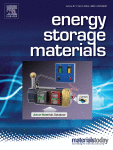
论文题目:In-Situ Formation of Quasi-Solid Polymer Electrolyte for Wide-Temperature Applicable Li-Metal Batteries
论文作者:Ya-Yue He, Xin-Yuan Shan, Yue Li, Zhen-Xi Li, Lin Li, Sheng Zhao, Shi-Lun Gao, Jia-Li Qu,Hua-Bin Yang*,Peng-Fei Cao*
发表期刊:Energy Storage Materials, 2024, 68: 103281

Abstract
As next-generation rechargeable batteries, the development of solid-state lithium-metal batteries (LMBs) in a multitude of applications is confronted with a trade-off between high energy density, safety, and wide-temperature tolerance. Especially in cold climates, their applications are challenged by insufficient dynamics in bulk electrolyte and at electrode/electrolyte interface. Herein, a flexible, highly ionic conductive, and low-temperature applicable quasi-solid polymer electrolyte (QSPE) is designed and fabricated, which achieves a stable Li-metal anode over a wide-temperature range (−20 ∼ 60 ℃). The QSPEs prepared via in-situ polymerization of polyethylene glycol (PEO)-based monomers in low-melting solvent (1,3-dioxolane (DOL) or ethyl difluoroacetate (EDFA)) endow low-temperature tolerance, prominent ionic conductivity (4.5 × 10−4 S cm−1 at −20 °C) and exceptional electrochemical performance over a wide-temperature range. Consequently, with the DOL-based QSPE (D-QSPE), the Li/D-QSPE/LiFePO4 cell presents stable, long-term cycling at −20 ℃ (minimal capacity degradation over 550 cycles) and excellent fast-charging capacity (capacity retention of 81 % over 1300 cycles at 5 C). Even utilizing a thin lithium foil (25 μm) and a high mass loading LiFePO4 cathode (2.5 mAh cm−2), the assembled Li/LFP cell with a N/P ratio of 1.96 still exhibits good cycling performance at −20 ℃. Additionally, the EDFA-based QSPE (E-QSPE) allows LMBs with NCM811 cathodes cycling over 140 cycles (capacity retention > 95 %) at −20 ℃. With the capability of circumventing sluggish ion transport kinetics of quasi-solid polymer LMBs in cold climates, the developed polymer electrolyte provides new pathways for safe, high-capability, and wide-temperature operable batteries.
